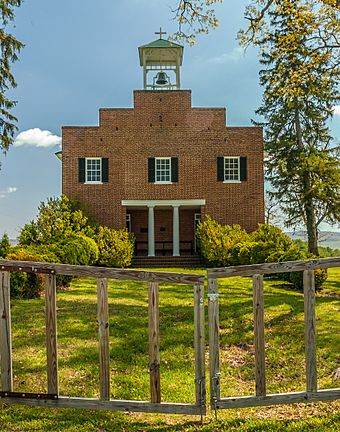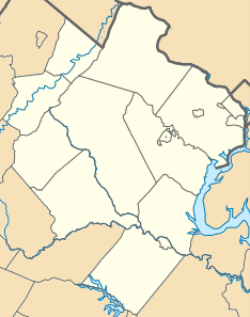Wickliffe Church facts for kids
|
Wickliffe Church
|
|
|
U.S. Historic district
Contributing property |
|

Wickliffe Church, April 2013
|
|
| Location | VA 608, E side, .5 mi. S of VA-WV line, Berryville, Virginia |
|---|---|
| Area | 2 acres (0.81 ha) |
| Built | 1846 |
| Architectural style | Greek Revival |
| NRHP reference No. | 95000241 |
Quick facts for kids Significant dates |
|
| Added to NRHP | March 17, 1995 |
Wickliffe Church is a very old church building in Berryville, Virginia. It's an Episcopal church, which is a type of Christian church. The building itself hasn't been used for regular church services since 1918. However, people still gather there once a year in August for a special "homecoming" service, and it's sometimes used for other events like weddings.
Contents
The Church's Story
Why Wickliffe Church Was Built
The brick church you see today was built in 1846. Before that, there was an older stone church on the same spot, built between 1817 and 1819. Families living in the area found it very hard to travel on bad roads to other churches like Old Chapel (Millwood, Virginia) or Christ Episcopal Church (Winchester, Virginia). So, they decided to build a church closer to home.
The church was named after John Wycliffe. He was famous for being one of the first people to translate the Bible into English.
Important People and Changes
A religious leader named Rev. William Meade was very important to the churches in this area. He lived in what became Clark parish and helped many churches. He later became a bishop, which is a high-ranking leader in the church.
In 1834, the Episcopal Diocese of Virginia officially allowed Wickliffe to become its own church area, called a parish. A few years later, in 1836, Clarke County was created from part of Frederick County, and Berryville became the main town for the new county.
The first stone church wasn't built very well and became unsafe by 1845. So, it was taken down, and the current brick church was built in its place. A school called Wycliffe Academy also operated on the church property for many years.
Wickliffe Church During the Civil War
The area near Wickliffe Church was important during the American Civil War. In July 1864, a big battle called the Battle of Cool Spring happened nearby. This was the largest fight in Clarke County during the war.
Right before this battle, Confederate soldiers, led by Major General Robert E. Rodes, camped on the church grounds. The battle was a major event that led to Union General Philip Sheridan being put in charge of the Union forces in the area.
After the War and Today
After the Civil War, the church congregation worked to start new churches in nearby towns. They helped create St. Mary's in Berryville and other churches in Virginia and West Virginia. In 1905, a woman named Hannah Williams gave money to build a school for African American children. That school building was later moved and is now part of St. Mary's Episcopal Church.
By 1918, fewer people were attending Wickliffe Church. Also, cars were becoming more common, making it easier for people to travel to other churches. So, the Wickliffe congregation joined with Grace Episcopal Church in Berryville. Grace Episcopal Church now takes care of the old Wickliffe Church building, keeping it safe for future generations.
Church Design and Features
The Wickliffe Church building is two stories tall and made of brick. In 1995, it was recognized as a Virginia and National Landmark. This is because it's a great example of the Greek Revival style. This style was popular in the 1800s and looks like ancient Greek temples.
The church has a special front porch area called a distyle-in-antis portico. It has two large columns in the Doric style, which are simple and strong. These columns lead to two main entrance doors that open into the church's main room, called the nave. There are also other doors on the sides that lead to stairs going up to a balcony, or gallery.
The church also has unique stepped gables (the triangular parts of the wall at the end of a roof) and an open belfry (where the church bell would be). What's really special about Wickliffe Church is that it hasn't been changed much over the years. It doesn't have electricity, modern plumbing, or other new additions, so it looks very much like it did when it was first built.
On the church property, there's also a cemetery where members of the Williams family are buried. They were the family who donated the land for the church to be built.
The church was added to the National Register of Historic Places in 1995. This is a list of places important to the history of the United States.
 | John T. Biggers |
 | Thomas Blackshear |
 | Mark Bradford |
 | Beverly Buchanan |




